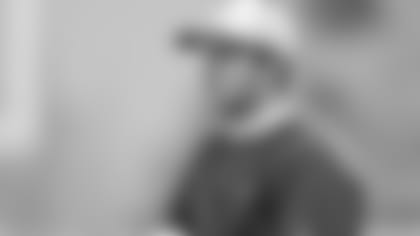ENGLEWOOD, Colo. --With such a broad job title, many people don't fully understand what exactly Offensive Quality Coach Brian Callahan does for the Broncos.
So, what is exactly does an NFL quality control coach do?
As it turns out, the better question might be, 'What doesn't an NFL quality control coach do?'
A typical in-season work day for Callahan begins at 6:15 a.m. and ends around 1 a.m.
He spends the morning getting the day's install package set up and distributed to players, he runs film during meetings, sits in on quarterback meetings and catalogs practice film.
Then he begins what he calls his, "second day" around 3 p.m.
During the season, he works on advance scouting of opponents, so from around 3 p.m. to 1 a.m. he watches opponent film and prepares scouting reports for Offensive Coordinator Mike McCoy.
As if that doesn't sound like enough of a workload, he's also in charge of pushing all updated playbooks and film to the team’s iPads.
Somehow, Callahan found the time to talk to DenverBroncos.com about his job duties, working with Peyton Manning and his goals as an NFL coach.
Take us through a typical day for you during the season?
"I'm in here by 6:15 a.m. or 6:30 a.m., then making sure, if the install's not already handed out, I'll get the install ready to go, copy all that and get it to the players. I run all the film during the meetings. I'm in the little cubicle up there. I do all that.
"After practice, I enter the practice into the computer and all the data that everybody needs to function is now in the computer. It starts all over again. Right around three o'clock is when that day's activities are finished, and then I start working on the next days' worth of stuff.
"I usually work from four or five in the evening until 12 or 1 o'clock. I'm usually a week, two weeks ahead on the opponents, so I'm working on the next week's opponent. As the week comes to a close, I get that stuff ready to go for the following week. But the film breakdown is what takes up a majority of the time in the afternoon and then the next days' worth of scouting report stuff. We look at our opponent's defensive film."
Is there a position group that you help out with the most?
"I work with the quarterbacks, and I'll be in the quarterback meetings with (Quarterbacks Coach) Adam (Gase). I was with the running backs two years ago. You rotate around to wherever you fit in the best and what you're really going to focus on."
What did you learn from that experience coaching the running backs when Running Backs Coach Eric Studesville was promoted to interim head coach in 2010?
"The biggest difference from doing (this) to actually communicating with the players is the preparation involved, being ready to meet with the players. I learned that real fast: you don't have to have all the answers. You have to know what you're doing and you have to prepare for it. You have to learn how to respond. When those guys start firing questions at you, you really have to know what they're asking. You have to learn how those guys respond to what you're saying. You have to be really clear. I thought that was the most beneficial part, was becoming better at communicating, at teaching what was going on."
What are the next steps to your career goals as an NFL coach?
"In 2010 I coached the running backs for four games and I felt like that was a great experience. I felt like I fit in well with those guys. Career-wise, if you want to be a coordinator, if you want to be part of the passing game, usually you have to be in the quarterback's room at some point. That's the fastest way to move up that ladder if that's what you want to do. To me, that's kind of where I fit best in my opinion."
Does it help you coach the quarterbacks having played that position at UCLA?
"Quarterback is what I played. At the end of the day, that's where I feel the most comfortable. That's where I've always felt the most comfortable just because I feel like I know it the best."
How has it been working with Peyton Manning?
"I'm learning all kind of stuff from Peyton, just his attention to detail, and the way he approaches each day and how he thinks about things, it kind of helps you as a coach and you look at that and go, I could have that for whenever I get my opportunity to do it. It helps you anticipate what a guy like him would want.
"He's been playing football longer than I've been coaching it. There are some things that he probably knows that I don't. That's kind of why we sit there and learn from him. And he still learns from other guys, too. Guys like that play that long because they're open to new things, they're open to learning. There's always a different way of doing things; a lot of different ways to do things successfully. When you're open to those, it's helpful."
What are your thoughts on the switch to having playbooks on iPads?"Whenever I hand out an install, I also pdf it, put in there, and then put it on the drive, make sure it's on the iPads. I'm kind of like the go-to guy besides the video guys. It's a great time-saving tool for us. At the end of the day, it will be a time-saving tool because we won't have to make as many copies; we won't have to stuff as many books. You just put it out there and it's good to go."






